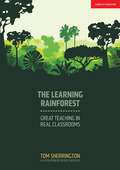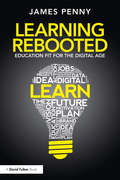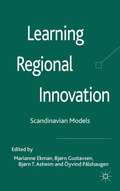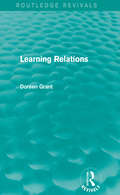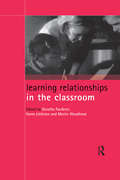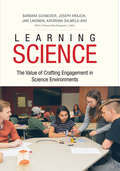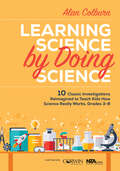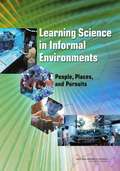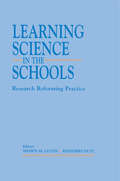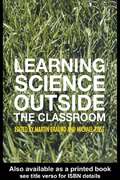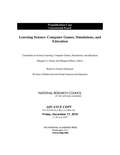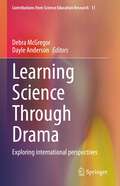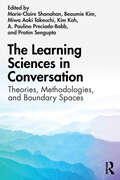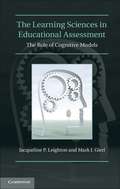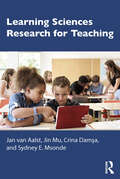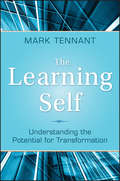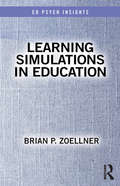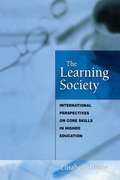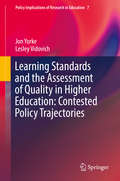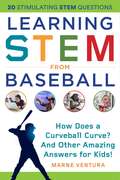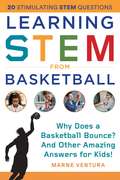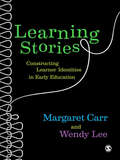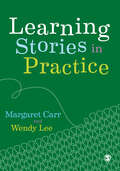- Table View
- List View
The Learning Rainforest: Great Teaching in Real Classrooms
by Tom SherringtonThe Learning Rainforest is an attempt to capture various different elements of our understanding and experience of teaching. It is a celebration of great teaching - the joy of it and the intellectual and personal rewards that teaching brings. It is aimed at teachers of all kinds; busy people working in complex environments with little time to spare. The core of the book is a guide to making teaching both effective and manageable; it provides an accessible summary of key contemporary evidence-based ideas about teaching and learning and the debates that all teachers should be engaging in. It's a book packed with strategies for making great teaching attainable in the context of real schools. The Learning Rainforest metaphor is an attempt to capture various different elements of our understanding and experience of teaching. Tom's ideas about what constitutes great teaching are drawn from his experiences as a teacher and a school leader over the last 30 years, alongside everything he has read and all the debates he's engaged with during that time. An underlying theme of this book is that a career in teaching is a process of continual personal development and professional learning as is engaging in fundamental debates rage on about the kind of education we value. As you meet each new class and move from school to school, your perspectives shift; your sense of what seems to work adjusts to each new context. In writing this book, Tom is trying to capture some of the journey he's been on. He has learned that it is ok to change your mind. More than that - sometimes it is simply necessary to get your head out of the sand, to change direction; to admit your mistakes.
Learning Rebooted: Education Fit for the Digital Age
by James PennyArguing that education systems are failing to keep up with the pace of change in society, The System Rebooted: Education Fit For the Digital Age, sets out a unique proposal for system-wide radical change. Focusing on the transformations needed in order to align education systems with current trends in society, the book stimulates discussion by offering a heightened understanding of what education reform needs to look like, and suggesting a way forward for both individual schools and whole systems. The book makes a clear delineation between learning and education, building a case for how learning, an essential skill, is often not allowed to flourish in many modern education systems. Chapters explore how rapid changes to technology are shaping the way young people share, collaborate and communicate and, arguing that education systems continue to produce young people who are not equipped with the skills that society needs, the book makes a cogent case for how education systems need to reflect these profound changes, as well as highlighting how learning organisations could rationalise their expenditure on technology. This unique and radical book brings topical issues to the forefront of discussion, and is essential reading for school leaders, policy makers, and governors.
Learning Regional Innovation
by Marianne Ekman Bj�rn Gustavsen Bj�rn T. Asheim �yvind P�lshaugenParticipation and social responsibility in innovation is the core theme of this book. Both are issues of organization and not of ethics, or the enforcement of other forms of obligations on individual actors. The need is for a democratization of innovation that can make innovation open to broad participation.
Learning Relations (Routledge Revivals)
by Doreen GrantDissatisfied with the effects of schooling on children from low-income families, Doreen Grant left her post as head of a secondary school in Liverpool and turned to research for solutions to this perennial social problem. This is a popular account of her involvement with under-privileged Glaswegian parents and children, and her attempt to address the problem of underachievement from the perspective of the home rather than the educational establishment. Combining the theory of international scholars such as Brofenbrenner, Bruner, Donaldson and Freire with practical experience, Doreen Grant indicates the improvements in children’s active learning when parents participate fully in the process of education. Learning Relations, first published in 1989, describes the creation of a coherent learning environment in the inner city: as parents gain confidence in their personal vocation as natural educators, it becomes clear that they are not only willing but fully capable of improving their children’s chances of success.
Learning Relationships in the Classroom
by Dorothy Faulkner Karen Littleton Martin WoodheadThis reader explores the nature of interactions between children and their teachers in the classroom. It emphasises the importance of such relationships for children's learning and for educational practice. Part 1 looks at different cultural conceptions of the teacher-learner relationship, and how this relates to schooling, cognitive development and the aquisition of knowledge. Part 2 takes a closer look at the role of language and dialogue in interactions between adults and children in classrooms. Part 3 describes research by developmental psychologists on peer interaction and collaborative learning, and discusses how it has advanced our understanding of how children learn from each other. Part 4 considers the implications of classroom-based collaborative learning initiatives and the potential for creating 'communities of enquiry' which change how we think about knowledge acquisition.
Learning Science: The Value of Crafting Engagement in Science Environments
by Barbara Schneider Joseph Krajcik Jari LavonenAn innovative, internationally developed system to help advance science learning and instruction for high school students This book tells the story of a $3.6 million research project funded by the National Science Foundation aimed at increasing scientific literacy and addressing global concerns of declining science engagement. Studying dozens of classrooms across the United States and Finland, this international team combines large-scale studies with intensive interviews from teachers and students to examine how to transform science education. Written for teachers, parents, policymakers, and researchers, this book offers solutions for matching science learning and instruction with newly recommended twenty-first-century standards.
Learning Science by Doing Science: 10 Classic Investigations Reimagined to Teach Kids How Science Really Works, Grades 3-8
by Alan ColburnTime-tested activities to teach the key ideas of science—and turn students into scientists! This witty book adapts classic investigations to help students in grades 3 through 8 truly think and act like scientists. Chapter by chapter, this accessible primer illustrates a “big idea” about the nature of science and offers clear links to the Next Generation Science Standards and its Science and Engineering Practices. You’ll also find: A reader-friendly overview of the NGSS Guidance on adapting the activities to your grade level, including communicating instructions, facilitating discussions, and managing safety concerns Case studies of working scientists to highlight specifics about the science and engineering practices
Learning Science by Doing Science: 10 Classic Investigations Reimagined to Teach Kids How Science Really Works, Grades 3-8
by Alan ColburnTime-tested activities to teach the key ideas of science—and turn students into scientists! This witty book adapts classic investigations to help students in grades 3 through 8 truly think and act like scientists. Chapter by chapter, this accessible primer illustrates a “big idea” about the nature of science and offers clear links to the Next Generation Science Standards and its Science and Engineering Practices. You’ll also find: A reader-friendly overview of the NGSS Guidance on adapting the activities to your grade level, including communicating instructions, facilitating discussions, and managing safety concerns Case studies of working scientists to highlight specifics about the science and engineering practices
Learning Science in Informal Environments: People, Places, and Pursuits
by National Research Council of the National AcademiesInformal science is a burgeoning field that operates across a broad range of venues and envisages learning outcomes for individuals, schools, families, and society. The evidence base that describes informal science, its promise, and effects is informed by a range of disciplines and perspectives, including field-based research, visitor studies, and psychological and anthropological studies of learning. Learning Science in Informal Environments draws together disparate literatures, synthesizes the state of knowledge, and articulates a common framework for the next generation of research on learning science in informal environments across a life span. Contributors include recognized experts in a range of disciplines--research and evaluation, exhibit designers, program developers, and educators. They also have experience in a range of settings--museums, after-school programs, science and technology centers, media enterprises, aquariums, zoos, state parks, and botanical gardens. Learning Science in Informal Environments is an invaluable guide for program and exhibit designers, evaluators, staff of science-rich informal learning institutions and community-based organizations, scientists interested in educational outreach, federal science agency education staff, and K-12 science educators.
Learning Science in the Schools: Research Reforming Practice
by Reinders Duit Shawn M. GlynnScience -- and the technology derived from it -- is having a dramatic impact on the quality of our personal lives and the environment around us. Science will have an even greater impact on the lives of our students. The lives of scientifically literate students will be enriched by their understanding, appreciation, and enjoyment of the natural world. To prosper in the near future, all students must become scientifically literate and embrace the notion of life-long learning in science. Without scientific literacy, it will become impossible for students to make informed decisions about the interrelated educational, scientific, and social issues that will confront them in the future. Intended for science teachers, teacher educators, researchers, and administrators, this volume is concerned with the innovative research that is reforming how science is learned in schools. The chapters provide overviews of current research and illustrate how the findings of this research are being applied in schools. This research-based knowledge is essential for effective science instruction. The contributors are leading authorities in science education and their chapters draw clear connections among research, theory, and classroom practice. They provide excellent examples from science classes in which their research has reformed practice. This book will help educators develop the scientific literacy of students. It bridges the gap between cutting-edge research and classroom practice to provide educators with the knowledge they need to foster students' scientific literacy.
Learning Science Outside the Classroom
by Martin Braund and Michael ReissThis book shows how a wide range of contexts for learning science can be used outside of the classroom, and includes learning: at museums, science centres and planetaria from newspapers, magazines and through ICT at industrial sites and through science trails at zoos, farms, botanic gardens, residential centres and freshwater habitats in school grounds. With contributions from well known and respected practitioners in all fields of science education and through using case studies, Learning Science Outside the Classroom offers practical guidance for teachers, assistant teaching staff and student teachers involved in primary and secondary education. It will help enable them to widen the scientific experience and understanding of pupils. The advice in this book has been checked for safety by CLEAPSS.
Learning Science Through Computer Games and Simulations
by National Research Council of the National AcademiesAt a time when scientific and technological competence is vital to the nation's future, the weak performance of U.S. students in science reflects the uneven quality of current science education. Although young children come to school with innate curiosity and intuitive ideas about the world around them, science classes rarely tap this potential. Many experts have called for a new approach to science education, based on recent and ongoing research on teaching and learning. In this approach, simulations and games could play a significant role by addressing many goals and mechanisms for learning science: the motivation to learn science, conceptual understanding, science process skills, understanding of the nature of science, scientific discourse and argumentation, and identification with science and science learning. To explore this potential, Learning Science: Computer Games, Simulations, and Education, reviews the available research on learning science through interaction with digital simulations and games. It considers the potential of digital games and simulations to contribute to learning science in schools, in informal out-of-school settings, and everyday life. The book also identifies the areas in which more research and research-based development is needed to fully capitalize on this potential. Learning Science will guide academic researchers; developers, publishers, and entrepreneurs from the digital simulation and gaming community; and education practitioners and policy makers toward the formation of research and development partnerships that will facilitate rich intellectual collaboration. Industry, government agencies and foundations will play a significant role through start-up and ongoing support to ensure that digital games and simulations will not only excite and entertain, but also motivate and educate.
Learning Science Through Drama: Exploring international perspectives (Contributions from Science Education Research #11)
by Debra McGregor Dayle AndersonThis book presents a wide range of international perspectives that explore the different ways the diverse forms of drama supports learning in science. It illustrates how learning science by adopting and adapting theatrical techniques can offer more inclusive ways for students to relate to scientific ideas and concepts. The theatrical processes by which subject matter can be introduced, thought about, discussed, transformed, enacted and disseminated are shown to be endless. The first section of the book considers different ways of theorising and applying drama in classrooms. The second section provides a range of case studies illustrating how role play, performance, embodiment and enquiry approaches can be utilised for learning in primary, secondary and tertiary education contexts. The third section demonstrates how different research methods from questionnaires, particular kinds of tests and even the theatrical conventions themselves can provide rich data that informs how drama impacts on learning science.
The Learning Sciences in Conversation: Theories, Methodologies, and Boundary Spaces
by Marie-Claire Shanahan Beaumie Kim Miwa Aoki Takeuchi Kim Koh A. Paulino Preciado-Babb Pratim SenguptaThe Learning Sciences in Conversation explores the unique pluralities, complex networks, and distinct approaches of the learning scientists of today. Focused on four key scholarly areas – transdisciplinarity, design, cognition, and technology – this cutting-edge volume draws on empirical and theoretical foundations to illustrate the directions, perspectives, methods, and questions that continue to define this evolving field. Contributions by researchers are put in dialogue with one another, offering an exemplary analysis of a field that synthesizes, in situ, various scholarly traditions and orientations to create a critical and heterogenous understanding of learning.
The Learning Sciences in Conversation: Theories, Methodologies, and Boundary Spaces
by Marie-Claire Shanahan Beaumie Kim Miwa Aoki Takeuchi Kim Koh A. Paulino Preciado-Babb Pratim SenguptaThe Learning Sciences in Conversation explores the unique pluralities, complex networks, and distinct approaches of the learning scientists of today. Focused on four key scholarly areas – transdisciplinarity, design, cognition, and technology – this cutting-edge volume draws on empirical and theoretical foundations to illustrate the directions, perspectives, methods, and questions that continue to define this evolving field. Contributions by researchers are put in dialogue with one another, offering an exemplary analysis of a field that synthesizes, in situ, various scholarly traditions and orientations to create a critical and heterogenous understanding of learning.
The Learning Sciences in Educational Assessment
by Mark J. Gierl Jacqueline P. LeightonThere is mounting hope in the United States that federal legislation in the form of No Child Left Behind will improve educational outcomes. As titanic as the challenge appears to be, however, the solution could be at our fingertips. This volume identifies visual types of cognitive models in reading, science and mathematics for researchers, test developers, school administrators, policy makers and teachers. In the process of identifying these cognitive models, the book also explores methodological or translation issues to consider as decisions are made about how to generate psychologically informative and psychometrically viable large-scale assessments based on the learning sciences. Initiatives to overhaul educational systems in disrepair may begin with national policies, but the success of these policies will hinge on how well stakeholders begin to rethink what is possible with a keystone of the educational system: large-scale assessment.
Learning Sciences Research for Teaching
by Jan van Aalst Jin Mu Crina Damşa Sydney E. MsondeLearning Sciences Research for Teaching provides educators with a fresh understanding of the use and implications of learning sciences scholarship on their studies and professional preparation. A highly interdisciplinary field, the learning sciences has been expressly focused on the advancement of teaching and learning in today’s schools. This introductory yet cutting-edge resource supports graduate students of teaching, leadership, curriculum, and learning design in research methodology courses as they engage with and evaluate research claims; integrate common methods; and understand experimental, case-based, ethnographic, and design-based research studies. Spanning the learning science’s state-of-the-art approaches, achievements, and developments, the book includes robust, accessible coverage of topics such as professional development, quantitative and qualitative data, learning analytics, validity and integrity, and more.
The Learning Self
by Mark TennantThis new book from the award-winning author of Psychology and Adult Learning puts the spotlight on the kind of learning that brings about significant personal change. Tennant explores the techniques, processes, and practices educators can use to promote learning that leads to change and examines assumptions about self and identity, how we are formed, and our capacity for change. Throughout the book, Tennant posits that individuals can be agents in their own self-formation and change by understanding and acting on the circumstances and forces that surround and shape them. Educators, he argues, must be open to different theoretical ideas and practices while simultaneously valuing these practices and viewing them with a critical eye. The book aims to: promote, among educators and others with an educational dimension to their work, a more critical approach to their learning designs and practices; equip individuals with a framework for understanding and being agents of their own self-formation and change.
Learning Simulations in Education (Ed Psych Insights)
by Brian P. ZoellnerTechnology-enabled simulations are increasingly used for students in K-12 education and have the potential to improve teaching and learning across domains. Across five chapters, this book explores the psychological foundation of simulation use in instruction, guiding readers through individual differences among learners and contexts while addressing theory, pedagogy, cognitive processes, and more. This concise volume is designed for any education course that includes simulations in the curriculum and will be indispensable for student researchers and both pre- and in-service teachers alike.
The Learning Society: International Perspectives on Core Skills in Higher Education
by Elisabeth DunneThis text provides perspectives in British and international interpretations of a learning society and what the roles of core skills are. The book covers what should be happening in theory and what is happening in practice and develops a critical awareness of the issues.
Learning Standards and the Assessment of Quality in Higher Education: Contested Policy Trajectories
by Jon Yorke Lesley VidovichThis book analyses accountability and quality policies relating to learning standards and examines their implications for assessment in higher education. Whilst primarily focusing on the Australian setting, this analysis is located within a broader frame of reference that includes the United Kingdom (UK), the United States of America (US), and the Organisation for Economic Cooperation and Development (OECD). Across these settings, comparative measures of learning have been seen as a policy 'solution' to the problem of 'proving quality' in a globalised and increasingly competitive higher education market. Comparative measures of learning depend on the specification of learning standards. Learning standards attempt to articulate the capabilities expected of graduates, and students' achievement of these is determined through the practices of assessment carried out within institutions. Quality policy, learning standards and assessment practices all intersect within the broader umbrella of accountability, with relevance to governments, higher education providers, employers, parents, and students. The findings reported in this book highlight a number of policy influences, including the rising demands for national and international comparative data on learning standards to compare quality and inform student choice in a globally competitive market.
Learning STEM from Baseball: How Does a Curveball Curve? And Other Amazing Answers for Kids! (STEM Sports)
by Marne VenturaGet your sports-loving kid excited about Science, Technology, Engineering, and Math By integrating the thrill of learning into the context of baseball, Learning STEM from Baseball presents a whole new ball game. Unleash the inner scientist, engineer, and mathematician in your child as they learn that sports and STEM aren't so separate after all. You'll both love finding out the answers to questions such as: What's a sweet spot?When was the pitching machine invented?How are baseballs made?How do numbers help baseball players? What are some STEM careers in baseball?And so much more! This easy-to-follow introduction to STEM topics sets kids up to make connections across subjects, discover new facts about baseball, and grow curious about academic fields!
Learning STEM from Basketball: Why Does a Basketball Bounce? And Other Amazing Answers for Kids! (STEM Sports)
by Marne VenturaGet your sports-loving kid excited about Science, Technology, Engineering, and Math By integrating the thrill of learning into the context of basketball, Learning STEM from Basketball presents an educational slam dunk. Unleash the inner scientist, engineer, and mathematician in your child as they learn that sports and STEM aren't so separate after all. You'll both love finding out the answers to questions such as: Why does a basketball bounce?What's a shot clock?Why does a basketball rim have a net?What's the math behind a free throw?And so much more! This easy-to-follow introduction to STEM topics sets kids up to make connections across subjects, discover new facts about basketball, and grow curious about academic fields!
Learning Stories: Constructing Learner Identities in Early Education
by Dr Margaret Carr Ms Wendy LeeShortlisted for the 2013 Nursery World Awards! Margaret Carr's seminal work on Learning Stories was first published by SAGE in 2001, and this widely acclaimed approach to assessment has since gained a huge international following. In this new full-colour book, the authors outline the philosophy behind Learning Stories and refer to the latest findings from the research projects they have led with teachers on learning dispositions and learning power, to argue that Learning Stories can construct learner identities in early childhood settings and schools. By making the connection between sociocultural approaches to pedagogy and assessment, and narrative inquiry, this book contextualizes Learning Stories as a philosophical approach to education, learning and pedagogy. Chapters explore how Learning Stories: - help make connections with families - support the inclusion of children and family voices - tell us stories about babies - allow children to dictate their own stories - can be used to revisit children's learning journeys - can contribute to teaching and learning wisdom This ground-breaking book expands on the concept of Learning Stories and includes examples from practice in both New Zealand and the UK. It outlines the philosophy behind this pedagogical tool for documenting how learning identities are constructed and shows, through research evidence, why the early years is such a critical time in the formation of learning dispositions. Margaret Carr is a Professor of Education at the University of Waikato, New Zealand. Wendy Lee is Director of the Educational Leadership Project, New Zealand.
Learning Stories in Practice
by Ms Wendy Lee Margaret CarrMargaret Carr and Wendy Lee have often been asked for a follow-on practical companion to their seminal 2012 book Learning Stories; a complimentary book that provides practical advice for teachers who are embarking on a ‘narrative assessments-for-learning’ journey. After much anticipation that book is here at last! Packed with a wide range of full-colour examples of real life learning stories from all over the world this practical guide is influenced by their ongoing work with teachers across many countries and the thoughtful comments and questions that teachers have asked during conversations at conferences, lectures and professional development programmes. They have turned these conversations with teachers and students into key ideas, and a practical framework on how to initiate and create good learning stories and why they are valuable. They show you how to write stories that capture the magic and excitement of each young child's journey through the early years and how to develop a deep professional understanding of the learning that takes place during this special and influential time in their lives.
